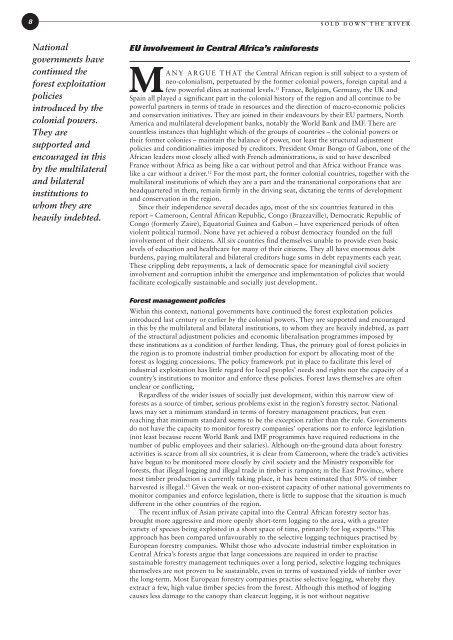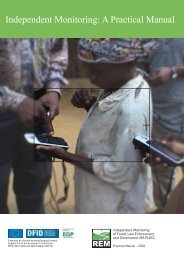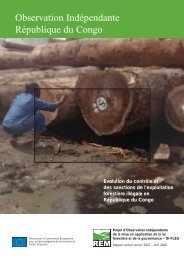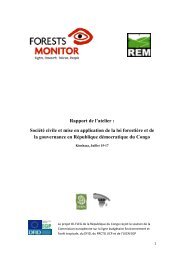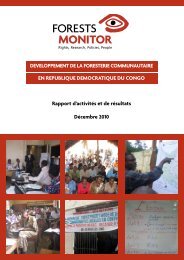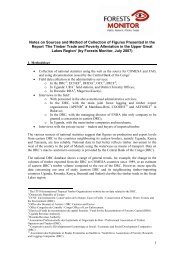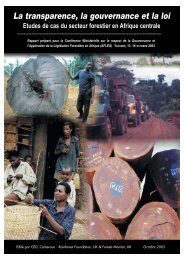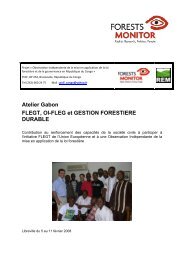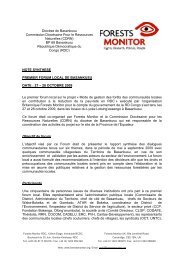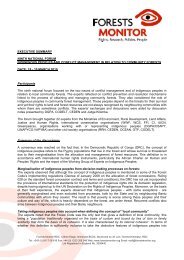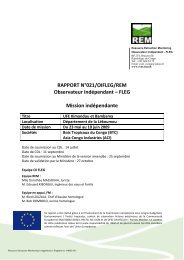8SOLD DOWN THE RIVERNationalgovernments havecontinued <strong>the</strong>forest exploitationpoliciesintroduced by <strong>the</strong>colonial powers.They aresupported andencouraged in thisby <strong>the</strong> multilateraland bilateralinstitutions towhom <strong>the</strong>y areheavily indebted.EU involvement in Central Africa’s rainforestsMANY ARGUE THAT <strong>the</strong> Central African region is still subject to a system ofneo-colonialism, perpetuated by <strong>the</strong> former colonial powers, foreign capital and afew powerful elites at national <strong>le</strong>vels. 11 France, Belgium, Germany, <strong>the</strong> UK andSpain all played a significant part in <strong>the</strong> colonial history of <strong>the</strong> region and all continue to bepowerful partners in terms of trade in resources and <strong>the</strong> direction of macro-economic policiesand conservation initiatives. They are joined in <strong>the</strong>ir endeavours by <strong>the</strong>ir EU partners, NorthAmerica and multilateral development banks, notably <strong>the</strong> World Bank and IMF. There arecount<strong>le</strong>ss instances that highlight which of <strong>the</strong> groups of countries – <strong>the</strong> colonial powers or<strong>the</strong>ir former colonies – maintain <strong>the</strong> balance of power, not <strong>le</strong>ast <strong>the</strong> structural adjustmentpolicies and conditionalities imposed by creditors. President Omar Bongo of Gabon, one of <strong>the</strong>African <strong>le</strong>aders most closely allied with French administrations, is said to have describedFrance without Africa as being like a car without petrol and that Africa without France waslike a car without a d<strong>river</strong>. 12 For <strong>the</strong> most part, <strong>the</strong> former colonial countries, toge<strong>the</strong>r with <strong>the</strong>multilateral institutions of which <strong>the</strong>y are a part and <strong>the</strong> transnational corporations that areheadquartered in <strong>the</strong>m, remain firmly in <strong>the</strong> driving seat, dictating <strong>the</strong> terms of developmentand conservation in <strong>the</strong> region.Since <strong>the</strong>ir independence several decades ago, most of <strong>the</strong> six countries featured in thisreport – Cameroon, Central African Republic, Congo (Brazzavil<strong>le</strong>), Democratic Republic ofCongo (formerly Zaire), Equatorial Guinea and Gabon – have experienced periods of oftenvio<strong>le</strong>nt political turmoil. None have yet achieved a robust democracy founded on <strong>the</strong> fullinvolvement of <strong>the</strong>ir citizens. All six countries find <strong>the</strong>mselves unab<strong>le</strong> to provide even basic<strong>le</strong>vels of education and healthcare for many of <strong>the</strong>ir citizens. They all have enormous debtburdens, paying multilateral and bilateral creditors huge sums in debt repayments each year.These crippling debt repayments, a lack of democratic space for meaningful civil societyinvolvement and corruption inhibit <strong>the</strong> emergence and imp<strong>le</strong>mentation of policies that wouldfacilitate ecologically sustainab<strong>le</strong> and socially just development.Forest management policiesWithin this context, national governments have continued <strong>the</strong> forest exploitation policiesintroduced last century or earlier by <strong>the</strong> colonial powers. They are supported and encouragedin this by <strong>the</strong> multilateral and bilateral institutions, to whom <strong>the</strong>y are heavily indebted, as partof <strong>the</strong> structural adjustment policies and economic liberalisation programmes imposed by<strong>the</strong>se institutions as a condition of fur<strong>the</strong>r <strong>le</strong>nding. Thus, <strong>the</strong> primary goal of forest policies in<strong>the</strong> region is to promote industrial timber production for export by allocating most of <strong>the</strong>forest as logging concessions. The policy framework put in place to facilitate this <strong>le</strong>vel ofindustrial exploitation has litt<strong>le</strong> regard for local peop<strong>le</strong>s’ needs and rights nor <strong>the</strong> capacity of acountry’s institutions to monitor and enforce <strong>the</strong>se policies. Forest laws <strong>the</strong>mselves are oftenunc<strong>le</strong>ar or conflicting.Regard<strong>le</strong>ss of <strong>the</strong> wider issues of socially just development, within this narrow view offorests as a source of timber, serious prob<strong>le</strong>ms exist in <strong>the</strong> region’s forestry sector. Nationallaws may set a minimum standard in terms of forestry management practices, but evenreaching that minimum standard seems to be <strong>the</strong> exception ra<strong>the</strong>r than <strong>the</strong> ru<strong>le</strong>. Governmentsdo not have <strong>the</strong> capacity to monitor forestry companies’ operations nor to enforce <strong>le</strong>gislation(not <strong>le</strong>ast because recent World Bank and IMF programmes have required reductions in <strong>the</strong>number of public employees and <strong>the</strong>ir salaries). Although on-<strong>the</strong>-ground data about forestryactivities is scarce from all six countries, it is c<strong>le</strong>ar from Cameroon, where <strong>the</strong> trade’s activitieshave begun to be monitored more closely by civil society and <strong>the</strong> Ministry responsib<strong>le</strong> forforests, that il<strong>le</strong>gal logging and il<strong>le</strong>gal trade in timber is rampant; in <strong>the</strong> East Province, wheremost timber production is currently taking place, it has been estimated that 50% of timberharvested is il<strong>le</strong>gal. 13 Given <strong>the</strong> weak or non-existent capacity of o<strong>the</strong>r national governments tomonitor companies and enforce <strong>le</strong>gislation, <strong>the</strong>re is litt<strong>le</strong> to suppose that <strong>the</strong> situation is muchdifferent in <strong>the</strong> o<strong>the</strong>r countries of <strong>the</strong> region.The recent influx of Asian private capital into <strong>the</strong> Central African forestry sector hasbrought more aggressive and more openly short-term logging to <strong>the</strong> area, with a greatervariety of species being exploited in a short space of time, primarily for log exports. 14 Thisapproach has been compared unfavourably to <strong>the</strong> se<strong>le</strong>ctive logging techniques practised byEuropean forestry companies. Whilst those who advocate industrial timber exploitation inCentral Africa’s forests argue that large concessions are required in order to practisesustainab<strong>le</strong> forestry management techniques over a long period, se<strong>le</strong>ctive logging techniques<strong>the</strong>mselves are not proven to be sustainab<strong>le</strong>, even in terms of sustained yields of timber over<strong>the</strong> long-term. Most European forestry companies practise se<strong>le</strong>ctive logging, whereby <strong>the</strong>yextract a few, high value timber species from <strong>the</strong> forest. Although this method of loggingcauses <strong>le</strong>ss damage to <strong>the</strong> canopy than c<strong>le</strong>arcut logging, it is not without negative
REGIONAL OVERVIEW 9environmental consequences. The search for <strong>the</strong> best trees means that companies drive roadsinto relatively large areas of forest to extract just a few trees. This opens up <strong>the</strong> forest tocommercial bushmeat hunters who have decimated wildlife in logging areas. The technique ofse<strong>le</strong>cting <strong>the</strong> largest trees of a particular species has consequences for local uses and for <strong>the</strong>maintenance of biodiversity, with <strong>the</strong> regeneration of <strong>the</strong> target species not guaranteed.Despite <strong>le</strong>gislation requiring increased <strong>down</strong>stream processing in-country, such as <strong>the</strong>production of sawn wood, veneer or o<strong>the</strong>r products, which would bring more revenue, <strong>the</strong>export of who<strong>le</strong> logs from <strong>the</strong> region still predominates, with <strong>the</strong> processing taking placeelsewhere, mainly in Europe or Asia. But value-added processing policies bring prob<strong>le</strong>ms of<strong>the</strong>ir own: demand for logs to supply large processing plants <strong>le</strong>ads to increased pressure on <strong>the</strong>forests, fuelling unsustainab<strong>le</strong> and il<strong>le</strong>gal timber harvesting. Some argue that <strong>the</strong>re is alreadyover-capacity in Cameroon if <strong>the</strong> forests are not to be destroyed.Some European companies have admitted that forestry operations have not beensustainab<strong>le</strong> in Central Africa in <strong>the</strong> past: a director of French company Rougier stated in aninterview with a French trade journal that, for <strong>the</strong> last 40 years, operations generally havemined <strong>the</strong> forest. 15 This unsustainab<strong>le</strong> harvesting has <strong>le</strong>d to companies moving into newareas of rainforest over time, <strong>le</strong>aving a trail of forest degradation in <strong>the</strong>ir wake. Many of <strong>the</strong>companies that have been operating for decades in Central Africa are only now starting todraw up forest management plans, although often this work is subsidised and undertakenby third parties, such as bilateral government departments or international NGOs. It is notc<strong>le</strong>ar to what extent European companies which operate as sub-contractors can and doinsist on sustainab<strong>le</strong> forest management plans when <strong>the</strong>y undertake logging on behalf ofo<strong>the</strong>r concession holders.International financial assistanceMuch of <strong>the</strong> drive towards industrial exploitation of Central Africa’s forests has arisendirectly out of structural adjustment and liberalisation policies imposed by multilateral andbilateral creditors. France is one of <strong>the</strong> largest bilateral <strong>le</strong>nders and aid donors to <strong>the</strong> regionand French companies play a significant part in exploiting <strong>the</strong> region’s forests (see tab<strong>le</strong> 1,page 11). O<strong>the</strong>r EU member states, as well as <strong>the</strong> EU itself, have provided large amounts offinancial assistance – as loans and grants – to Central African countries for decades. Fundsare often used for <strong>the</strong> preparation of forest inventories, for assistance to EU forestrycompanies to draft forest management plans or for <strong>the</strong> establishment and running ofconservation areas. The European Commission (EC) has made a number of policy statementsregarding tropical forests, which have made it c<strong>le</strong>ar that <strong>the</strong> EC sees its ro<strong>le</strong> in <strong>the</strong> context ofconserving tropical forests. In 1989, this included a strategy to establish actions withreference to timber trade, within which was foreseen <strong>the</strong> establishment of a code of conductfor European logging companies. 16 Despite being seen as a priority, this has not happened todate. In 1995, a Forest Protocol was added to <strong>the</strong> Lomé Convention (Protocol No 10). ThisProtocol requests, among o<strong>the</strong>r things, support to assist African, Caribbean and Pacific(ACP) countries to develop sustainab<strong>le</strong> forest management, and stresses <strong>the</strong> need to get woodfrom sustainably managed forests onto <strong>the</strong> market. 17 One of <strong>the</strong> EU’s largest conservationand sustainab<strong>le</strong> development projects is <strong>the</strong> Conservation and Rational Utilisation of <strong>the</strong>Forest Ecosystems of Central Africa (ECOFAC), which operates in six protected areas in <strong>the</strong>region. The project was established in 1992 and has received US$ 33 million.The World Bank has provided technical assistance for forestry sector reform, helpingwith <strong>the</strong> drafting of <strong>the</strong> current forestry law in Cameroon and <strong>the</strong> draft new forestry law inGabon, for examp<strong>le</strong>. This technical assistance has been firmly based on supporting <strong>the</strong>development of <strong>the</strong> industrial timber sector, with <strong>the</strong> objective of improving <strong>the</strong> efficiency oftimber extraction and in particular <strong>the</strong> capturing of economic rent from <strong>the</strong> sector. Whilst<strong>the</strong> competitive tendering process introduced into Cameroon may reduce, but not eliminate,corruption among civil servants and transnational employees, <strong>the</strong> fact that <strong>the</strong> biddingprocess is weighted in favour of financial ra<strong>the</strong>r than technical merit does not encourage <strong>the</strong>promotion of sustainab<strong>le</strong> forestry management, and may indeed foster short-term profitseekingover long-term sustainab<strong>le</strong> forest management (see Cameroon, p. 13).By far <strong>the</strong> most important step towards assisting long-term sustainab<strong>le</strong> development in<strong>the</strong>se countries would be debt cancellation. Most debt is owed to <strong>the</strong> G7 group of countries,ei<strong>the</strong>r directly or through <strong>the</strong> World Bank and IMF. Many of <strong>the</strong> countries in this reportspend more on debt repayments than <strong>the</strong>y do on health and education combined, and repaymore money than <strong>the</strong>y receive in grants each year. Some G7 countries have p<strong>le</strong>dged tocancel at <strong>le</strong>ast some of <strong>the</strong> outstanding debt. The World Bank and IMF have established <strong>the</strong>Heavily Indebted Poor Countries Initiative (HIPC), which will cancel some, but not all, debtof some countries (see HIPC, right). Despite <strong>the</strong> <strong>le</strong>vels of poverty in each of <strong>the</strong> countries inthis report, only Cameroon has qualified to have some of its debt cancel<strong>le</strong>d, although this isconditional on a number of factors, including institutional reform within governmentregarding <strong>the</strong> forestry sector.The primary goalof forest policiesin <strong>the</strong> region is topromote industrialtimber productionfor export byallocating most of<strong>the</strong> forest asloggingconcessions.HIPCThe Heavily-IndebtedPoor Countries Initiative(HIPC) was established in1996 by <strong>the</strong> World Bankand IMF and introduced<strong>the</strong> concept of “debtsustainability”. Creditorsassess how much of itsdebt a country can pay offover <strong>the</strong> medium- to longterm(sustainab<strong>le</strong> debt)and <strong>the</strong>n write-off <strong>the</strong>remainder (unsustainab<strong>le</strong>debt). Only debts accruedbefore a certain datequalify for HIPC, not alldebt. The measurement of“sustainab<strong>le</strong>” debt isbased mainly on <strong>the</strong> ratioof debt service paymentsto export earnings, not toa country’s absolutepoverty or its peop<strong>le</strong>’spoverty.To qualify forreductions, a countrymust spend six yearsengaged in strict economicreforms under IMFsupervision. It must openitself up to foreign goods,privatise state-ownedenterprises, deregulate itsfinancial and bankingsectors, cut publicspending and imp<strong>le</strong>ment apoverty reductionstrategy. One of <strong>the</strong>central purposes of <strong>the</strong>HIPC Initiative is toencourage privateinvestment. An estimatedhalf of <strong>the</strong> HIPC -designated countries willnot meet <strong>the</strong> reformtargets and thus will notqualify for debt relief.


